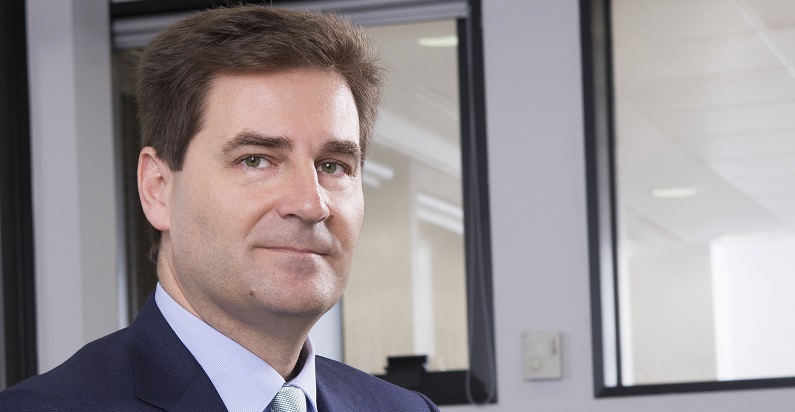-
12 January 2015
Category : Interview
”The FIIAPP creates opportunities for foreign outreach by public administrations”
El director de la FIIAPP, Pedro Flores, hace balance del 2014 y desvela los objetivos y retos de la Fundación para este año. The Director of the FIIAP, Pedro Flores, sums up 2014 and explains the objectives and challenges of the Foundation for this year.

The year 2014 is coming to an end. What headline should we use to ring out the old year?
The year 2014 has been the one with the highest number of awarded contracts and the largest budgetary execution volume in the history of the Foundation. With new contract awards totalling more than €60 million and execution of nearly €45 million, we’ve been able to increase our activity in the service of administrations (56% increase in execution in the last five years). With outside funding exceeding 90% of the annual budget, the FIIAPP is creating opportunities for foreign outreach by Spanish public administrations at a very low cost to the General State Administration (AGE).
– What are the most important projects that were managed this year?
The FIIAPP managed the 300th twinning programme of the EU, making it the leading European operator for these types of projects. In addition, in coordination with the MAEC and Interior, we’ve managed to make Spain a major actor in the execution of EU activities in the area of prevention of chemical, biological, radiological and nuclear (CBRN) threats, including activities in regions affected by Ebola. Another important milestone is the diversification of funding sources for our activities, with a significant degree of direct contracting of services by middle-income countries, such as Colombia, which are interested in the experiences of Spanish administration in the application of public policies, and the signing of agreements with the World Bank and the Inter-American Development Bank.
– How is the FIIAPP promoting Brand Spain?
The actions of the FIIAPP are within the framework of Spanish foreign policy and they support the activities of the Spanish government in the priority geographic and action areas. It’s an instrument for exporting the best practices and public policy models of the Spanish government. It contributes to promoting and strengthening relationships of trust with the governments of other countries and with international bodies in sectors like security, climate change, infrastructure management and modernization of public administrations, among others. The 1,000 civil servants sent abroad each year are ambassadors for Brand Spain. They carry their knowledge to the 89 countries where they work, and there they are considered consummate professionals.
– What sectors does the FIIAPP work in and which does it want to strengthen?
The FIIAPP contemplates the action of the AGE and works transversally in most of the action areas established in Law 2/2014, of 25th March, on Foreign Action and Service of the State in its second chapter.
Currently it acts in nine priority sectors for foreign action: Social Policies and Rights, Migration and Mobility, Public Finance, Development and Communication, Green Economy, Security and Development, the Fight Against Organized Crime, Justice, and Transparency.
It also participates in joint activities with the AECID (projects) and the SGCID (supporting the Assessment and Monitoring Plan and effectiveness of cooperation), and supports some activities of the AGE (evaluation of labour reform, evaluation of the reform of public administrations).We strengthen the activities that are priorities for our administrations, but we want to become a benchmark in the management of international cooperation projects that address global threats (related to security in all its aspects [bio, cyber, citizen, physical, etc.], climate change and migration, etc.).
– What is the impact of FIIAPP projects on the lives of citizens all over the world?
We manage experience exchanges between public administrations. What does that mean? That we transfer knowledge and best practices in public policies to public-sector managers who are designing or implementing new policies in their countries. Out of these experiences, they choose the inputs that can be adapted to their national reality. These measures then have an impact that benefits the citizen. In Cuba, in a project we managed in support of incipient socio-economic reforms in the country, they defined us as “knowledge messengers”.
For example, Spain has one of the most prestigious organ transplant systems in the world. In Moldova, which in the 1990s became a source country for illegal organs, Spanish experts are working with the administrations to strengthen the laws and improve the efficiency of the transplant service. They’re bringing it into compliance with international quality standards and contributing to making Moldovans recover their trust in the system and in healthcare workers, and breaking the mental association between transplants and organ trafficking.
– What are the objectives for the coming year?
As a public operator, the FIIAPP will prioritize all activities aimed at improving its systems and effectiveness in managing the public funds it administers. We are looking ahead at considerable work related to concentrating on activities that are priority for the administrations and identifying and disseminating internationally the best practices of these administrations. We also want to finish introducing the impact assessment as a fundamental element of our projects.
– Will the assessment be a strong point in coming years?
Our Assessment Programme has the principal objective of undertaking joint activities with the SGCID within the framework of the Spanish Cooperation Assessment Plan. Nonetheless, the Foundation wants to introduce the impact assessment as one of its identifying features within the framework of the management of its projects. We want the assessments to guide the design of future activities and thereby contribute to developing a results-based model. Assessment is fundamental for improving our management and increasing the impact of our activities in terms of real improvements in public policies that benefit the citizen.
You can listen to the interview with Pedro Flores on “Public Cooperation Around the World” on Radio 5
The views and opinions expressed in this blog are the sole responsibility of the person who write them.




